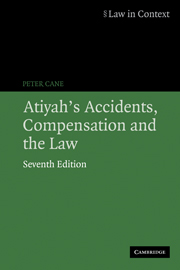Book contents
- Frontmatter
- Contents
- Preface
- List of abbreviations
- List of tables
- Table of legislation
- Table of cases
- Part One The Issues in Perspective
- Part Two The Tort System in Theory
- Part Three The Tort System in Operation
- Part Four Other Compensation Systems
- Part Five The Overall Picture
- 15 A plethora of systems
- 16 The cost of compensation and who pays it
- 17 The functions of compensation systems
- Part Six The Future
- Index
16 - The cost of compensation and who pays it
Published online by Cambridge University Press: 05 June 2012
- Frontmatter
- Contents
- Preface
- List of abbreviations
- List of tables
- Table of legislation
- Table of cases
- Part One The Issues in Perspective
- Part Two The Tort System in Theory
- Part Three The Tort System in Operation
- Part Four Other Compensation Systems
- Part Five The Overall Picture
- 15 A plethora of systems
- 16 The cost of compensation and who pays it
- 17 The functions of compensation systems
- Part Six The Future
- Index
Summary
In this chapter we examine what the various compensation systems we have considered cost, and how those costs are paid. The Pearson Commission provided a lot of information about the costs of the tort system in particular. There are two different types of costs, private costs and social costs. The main function of compensation systems is to transfer money from some people to others; the sums so transferred are a (private) cost to those who have to pay them, but they are not a social cost. They do not reduce society's resources as a whole. In economic terms, they are transfer payments. So far as transfer payments are concerned, the questions of interest concern the total value of the payments and the way the burden is distributed. In the context of compensation for personal injuries, social costs are, in essence, the administrative costs of making transfer payments. Administrative costs are social costs because they are the measure of the administrative resources consumed in making the transfer payments. The question of how much ought to be paid out in compensation is answered by reference to the goals of the compensation system in question; but the question of how much ought to be spent in making the compensation payments is purely a matter of efficiency. The lower the administrative costs of a system as a proportion of compensation paid out under the system, the more efficient the system is as a compensation system, whatever its goals.
- Type
- Chapter
- Information
- Atiyah's Accidents, Compensation and the Law , pp. 395 - 407Publisher: Cambridge University PressPrint publication year: 2006

